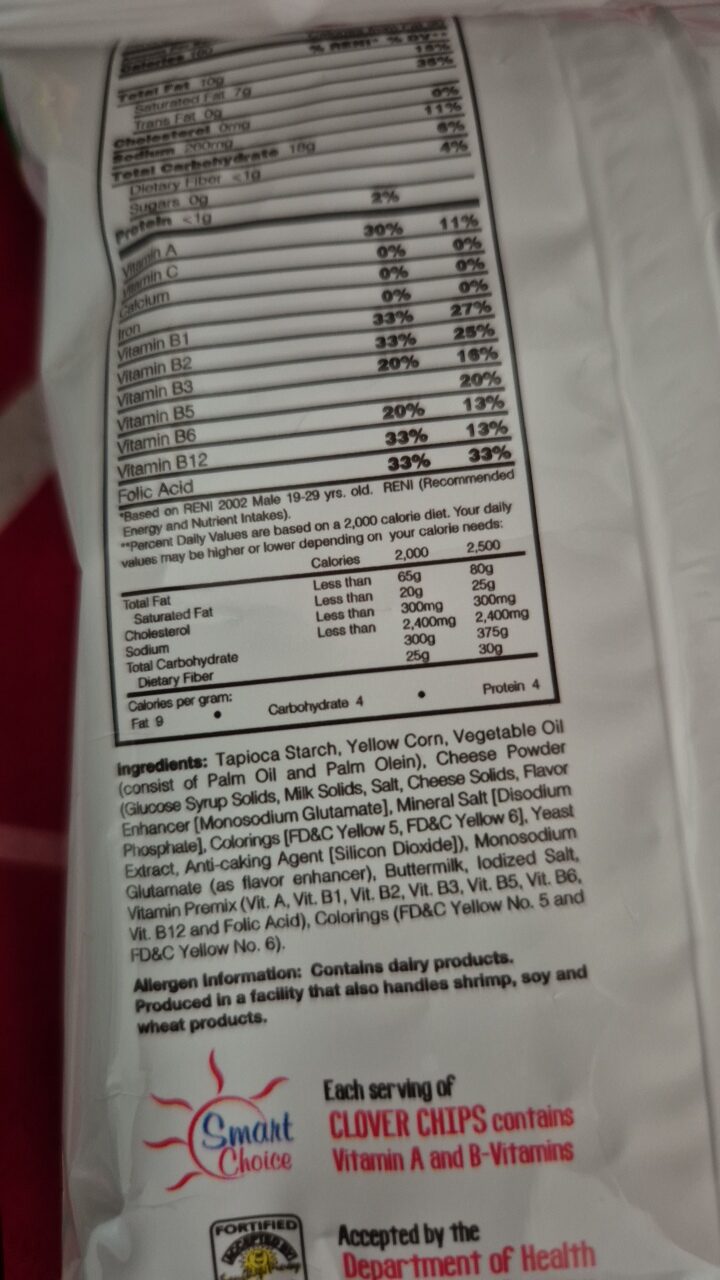
Barcode: 4800216120013
clover chips
HALAL
📝 Reason: The product does not contain any ingredient from the Haram ECodes list (like E120, E124). However, several ingredients such as cheese powder, cheese solids, vitamin premix, and certain vitamins (A, B5, B12) are doubtful due to unspecified sources which may be animal-derived or use non-halal enzymes. In Islam, when doubt is present regarding the Halal status of ingredients (per Quran 5:3 and majority scholarly opinion), the status becomes doubtful until proven Halal. Without clear certification or ingredient origin, the safest verdict is Doubtful (Mashbooh). See also IFANCA and HalalRC guidelines.
🏷️ Category: Chips
📄 Certificates: Vitamin A And B Vitamins, Accepted By The Department Of Health, Vegetarisch
Ingredients:
Details
Understanding the Halal Status of Clover Chips
Clover Chips are a popular snack option enjoyed by many. But for those adhering to halal dietary guidelines, ensuring the Halal status of food products is crucial. This post delves into the Halal status of Clover Chips and examines each ingredient and E-number to provide clarity.
What Makes Clover Chips Halal?
The classification of Clover Chips as Halal is primarily based on the absence of Haram (forbidden) E-numbers. The primary ingredients include:
- Tapioca starch
- Yellow corn
- Vegetable oil
- Cheese powder
- Milk solids
- Salt
- Cheese solids
- Flavor enhancer
- Monosodium glutamate
- Vitamin premix (including various vitamins)
While the core ingredients are sourced from plant-based materials and are generally considered Halal, there are some ingredients that raise concerns due to their ambiguous sources, such as cheese powder and certain vitamins.
Ingredient Breakdown
Let’s break down the ingredients and their Halal status:
- Tapioca starch: Derived from cassava root, this starch is plant-based and Halal. Learn more.
- Yellow corn: A plant-based ingredient considered Halal. Learn more.
- Vegetable oil: Sourced from plants like soybean or sunflower, it is Halal unless contaminated. Learn more.
- Cheese powder: This may contain animal-derived enzymes, making its Halal compliance doubtful without certification. Learn more.
- Milk solids: Generally Halal as long as they’re pure and uncontaminated. Learn more.
- Salt: A mineral that is universally Halal. Learn more.
- Cheese solids: Similar to cheese powder, without clear origins, its Halal status is uncertain. Learn more.
- Flavor enhancer: Its source is unspecified, leading to doubts. Learn more.
- Monosodium glutamate (MSG): Generally derived from plant sources, considered Halal. Learn more.
- Vitamin premix: Vitamins can be synthetic or animal-derived, thus their Halal status is dubious. Learn more.
E-Numbers and Their Halal Status
Clover Chips include several E-numbers, which are often scrutinized for Halal compliance:
- E102 (FD&C Yellow 5): This artificial coloring is considered Halal. Learn more.
- E110 (FD&C Yellow 6): Another synthetic coloring that is generally Halal. Learn more.
- E551 (Silicon Dioxide): A mineral considered Halal. Learn more.
The majority of the E-numbers in Clover Chips are Halal, yet certain aspects remain ambiguous due to non-specific ingredient sources, particularly for flavor enhancers and certain dairy derivatives.
Conclusion: Is Clover Chips Halal?
In conclusion, while Clover Chips are primarily made from Halal ingredients, the presence of certain components calls into question their overall status. The absence of clear certification or ingredient origins means that they fall under the category of doubtful (Mashbooh). It’s essential to gather more information from manufacturers or seek HALAL certification bodies like IFANCA or HalalRC to ensure dietary compliance.
For those committed to following a Halal diet, exercising caution is advised when consuming Clover Chips until further clarification is obtained regarding their ingredient origins, particularly involving cheese and flavor enhancers.
